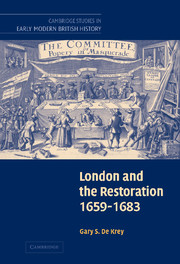Book contents
- Frontmatter
- Contents
- List of figures
- Map
- List of tables
- Preface
- List of abbreviations
- Part I Crisis, 1659–1660
- Part II Settlement and unsettlement, 1660–1679
- Part III Crisis, 1679–1682
- Introduction: London and the Restoration crisis, 1679–1682
- 4 Parliament and Protestantism in crisis: the emergence of parties in London, 1679–1681
- 5 The contest for the city, 1681–1682
- 6 Party matters: communities, ideas, and leaders in a divided city, 1679–1682
- Part IV Crisis and conspiracy, 1682–1683
- Conclusion: London and the end of the Restoration
- Appendices
- Appendix I 1670 London dissenting subscription
- Appendix II London dissenting common councilmen, 1669–1671
- Appendix III Whig party leaders
- Appendix IV Tory party leaders
- Bibliography
- Index
- Titles in the series
6 - Party matters: communities, ideas, and leaders in a divided city, 1679–1682
Published online by Cambridge University Press: 07 May 2010
- Frontmatter
- Contents
- List of figures
- Map
- List of tables
- Preface
- List of abbreviations
- Part I Crisis, 1659–1660
- Part II Settlement and unsettlement, 1660–1679
- Part III Crisis, 1679–1682
- Introduction: London and the Restoration crisis, 1679–1682
- 4 Parliament and Protestantism in crisis: the emergence of parties in London, 1679–1681
- 5 The contest for the city, 1681–1682
- 6 Party matters: communities, ideas, and leaders in a divided city, 1679–1682
- Part IV Crisis and conspiracy, 1682–1683
- Conclusion: London and the end of the Restoration
- Appendices
- Appendix I 1670 London dissenting subscription
- Appendix II London dissenting common councilmen, 1669–1671
- Appendix III Whig party leaders
- Appendix IV Tory party leaders
- Bibliography
- Index
- Titles in the series
Summary
INTRODUCTION: PARTY AND POLARIZATION
The civic elections of 1682 revealed the extent of party feeling and party organization in London. Party confrontations were a natural expression of the different hopes and fears of divergent Protestant communities. This chapter examines both the Whig and Tory discourse that dominated the public sphere of London in the Restoration Crisis and the different communities in which these opposite political and religious languages flourished. It begins with a topographic analysis of urban politics that anchors the expression of partisanship in contrasting socio-geographic spaces in the Corporation of London. Party in London in 1679–82 was a neighborhood affair, an expression of the local networks of friendship and affinity that have already been seen, especially in the civic Whigs' political petitioning and feasting. The chapter also examines how urban debate about the succession and parliament was shaped by the different discursive traditions maintained in these party-inclined spaces. Finally, Chapter 6 examines the leaderships and the electoral followings of the two parties: they were captained by contrasting political elites and favored by contrasting collections of guild electors. The different communities, ideas, leaders, and electoral followings that sustained partisanship in London all suggest that party is no misplaced historical construction in analysis of the Restoration Crisis.
Historians have become wary of employing binary divisions in the analysis of early modern English political life, but a polarization of opinion nevertheless accompanied the expression of partisanship in London and the kingdom during the crisis.
- Type
- Chapter
- Information
- London and the Restoration, 1659–1683 , pp. 272 - 332Publisher: Cambridge University PressPrint publication year: 2005
- 1
- Cited by



